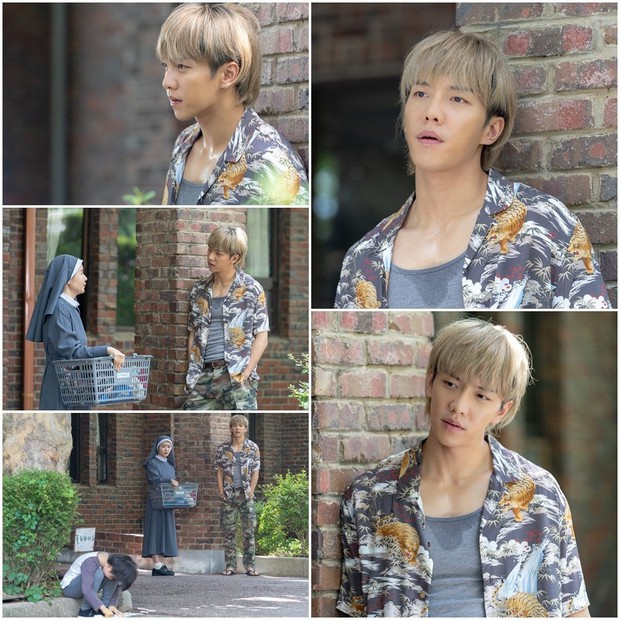Performing arts festival questions contemporary society
 |
| "Kafka," directed by Kirill Serebrennikov of Russia's Gogol Center, will open this year's Seoul Performing Arts Festival (SPAF) on Oct. 3. |
One of the most anticipated moments in the performing arts scene in Korea is the Seoul Performing Arts Festival (SPAF), which provides an opportunity to see the world's most artistic theatrical events in Seoul while promoting homegrown plays and dances.
This year, the festival is packed with diverse performances transcending genres and portraying the anxiety of the time.
 |
| Kim Do-il, president of the Korea Arts Management Service |
Kim Do-il, president of the Korea Arts Management Service (KAMS) which organizes the festival, said SPAF aims to embrace diversity in performing arts through experimental theater.
"This year's SPAF features 19 productions, reflecting a contemporary sense of sociality and artistry, which sheds light on human desire, conflict and irrationality. While previous editions of SPAF centered on traditional plays and dance, we blur the boundary between genres and include multidisciplinary performances this year," Kim said.
The performances are held at the ARKO Arts Theater, Daehakro Arts Theater and the Sejong Center for the Performing Arts from Oct. 3-20.
The international performances are from seven countries including Germany, Denmark, Russia, Belgium, France, Israel and Finland and two are cooperation programs.
Director Lee Byung-hoon, who was in charge of the play programs, noted that the selected works show the world we live in and provide food for thought.
"They might not be glitzy and glamorous, but these plays poses the timeless question about the present and future," Lee said.
This year's SPAF opens with "Kafka" from the Gogol Center of Russia. Directed by Kirill Serebrennikov, the play revolves around the Bohemian author Franz Kafka (1883-1924). Kafka's works were mostly published after his death against his will and the Russian troupe exercises an imaginative take on the famous yet controversial writer's life based on a biography by Valery Pecheikin. "Kafka" will be staged at ARKO Arts Theater on Oct. 3-4.
 |
| "The Forgotten Land" by Jean-Michel d'Hoop |
Denmark-based director Eugenio Barba is considered the founder of theatrical anthropology and his play premieres in Korea at SPAF 2019. "The Chronic Life" by the Odin Theatre will be staged at the Korea National University of Arts Theater from Oct. 3-5. Set in 2031, after the World War III, it revolves around a boy who is looking for his father and people from various backgrounds telling the boy to give up hope. The play is performed in Danish, Spanish, English, Romanian, Chechen and Basque, but no subtitles are provided upon the request of the troupe.
"The Forgotten Land" by Jean-Michel d'Hoop of Belgium is a fictional puppet play based on the Chernobyl incident in 1986. The play invites audiences to a "natural radiation protection zone" and peculiar wildlife and people living there at ARKO Arts Theater from Oct. 18-20.
For dance, experimental choreographers present their works at the 2019 SPAF.
Company Wang Ramirez will bring "Borderline," created by the company's Honji Wang and Sebastien Ramirez at ARKO Arts Theater from Oct. 18-19. The highly-praised dance is a breakthrough in Wang-Ramirez performances, creating an interaction between physical power on stage and story told through voice-over.
 |
| "Nasty" by Susanna Leinonen Company |
Finland's Susanna Leinonen Company presents "Nasty," a dance questioning conflicting demands and expectations shape the female body at ARKO Arts Theater on Oct. 12-13.
The Inbal Pinto Dance Company from Israel's "Fugue" features music by Maya Belsitzman. It resonates with color, sound and sense in a flow of time and space under the choreography of Inbal Pinto. "Fugue" is performed at ARKO Arts Theater on Oct. 12-13.
The SPAF's attempt to bring more diverse works to Seoul sparked a controversy as well.
"In the Heart of Forest," a collaboration among Korea, France and Japan, was a hot potato since it is helmed by Japanese director Oriza Hirata. Known for his science play series, Hirata's works have been staged in Korea previously garnering favorable reviews. However, souring diplomatic relations between Japan and South Korea made the organizers think twice about their decision to introduce Hirata's latest epitome of his series.
"Amid the current economic dispute with Japan, we might be questioned over whether it is right to collaborate with a Japanese director on 'In the Heart of Forest. However, we believe that art should be free from politics," Kim said. "We also think that the cultural awareness of Koreans is mature enough for a Japanese thespian's work."
Other cooperative programs showcase Korea's prominence in producing new and innovative works.
"Red Oleanders" is a collaborative project between the Asia Culture Institute and Project While. Directed by Kim Jeong and premiered at the Asia Culture Center in southern city of Gwangju earlier this year, the performance reinvents Rabindranath Tagore's play with an emphasis on physicality. "Red Oleanders" is staged at ARKO Arts Theater from Oct. 5-6.
"Caged" is a collaboration between the ONE Foundation for Culture and Arts of Bulgaria and the Gaya Dance Company of Korea. Created by aspiring choreographer Kim Pan-sun, the dance portrays various aspects of fear in our lives at the M Theater of Sejong Center for the Performing Arts on Oct. 15-16.
Other Articles
-

“Flower Crew: Joseon Marriage Agency” Cast Shares Points To Look Forward To Ahead Of Its Premiere
-

Kim Hye Yoon And SF9’s Rowoon Only Have Eyes For Each Other In Fantastical “Extraordinary You” Posters
-

Ji Chang Wook, Won Jin Ah, And Yoon Se Ah Show Striking Gazes In “Melting Me Softly” Posters
-

[K-Drama]: Create a new image of Lee Seung Gi as a Kpop idol in "Vagabond"
-

[K-Drama]: 3 things "Graceful Family" does not have but makes Korean audiences love
-

Song Joong-ki’s ‘Arthdal Chronicles’ records lowest TV rating to date
-

Ticket sales of 'The Bad Guys: Reign of Chaos' exceed 1 mln on 3rd day after release
-

Jay Park Heats Up Singapore with SEXY 4EVA Tour
-

Exit – A No Frills, No Fuss Action Film That is Exciting Yet Endearing
-

StarHub Night of Stars Presents 1st Meet-and-Greet Session with Public Appearance of Sung Hoon
-

[K-Star]: 6 handsome Korean actors have sweet voices. Can you guess who are they
-

Female duo BOL4 mature in music, style
Genres
- Accident
- Action
- Adventure
- Alien
- Amnesia
- Ancient legend
- Animals
- Animation
- Arthouse
- Artificial Intelligence
- Award Winning
- Based on a Comic
- Based on True Story
- Betrayal
- Biography
- BL
- Bodyguard
- Bromance
- Business
- Chambara
- Childhood
- Christmas
- Cohabitation
- Cold Man
- Coma
- Comedy
- Concert
- Conglomerate
- Conspiracy
- Contract Relationship
- Corruption
- Crime
- Criminal
- Curse
- Dance
- Deity
- Demon
- Detective
- Disability
- Disaster
- Documentary
- Drama
- Eastern
- Educational
- Entertainment
- Environment
- Erotica
- Espionage
- Exorcism
- Exploitation
- Fairy
- Family
- Fantasy
- Fashion
- Feminism
- Food
- Foreign
- Friendship
- Game Developer
- Gangster
- Geishas
- Gore
- Goryeo Dynasty
- Grudge
- Gumiho
- Harem
- Hidden Identity
- Historical
- Horror
- Hostage
- Human
- Hypnotism
- Idol Drama
- Indie
- Instructional
- Investigation
- Jidai Geki
- Josei
- Kidnapping
- Kung Fu
- Law
- legal
- Lesbian
- LGBTQ+
- life
- Love Triangle
- Mafia
- Magic
- Manga
- Manhua
- Martial Arts
- Mature
- Medical
- melodrama
- Mermaid
- Military
- Miniseries
- Misunderstanding
- Monster
- Murder
- Music
- Musical
- Mystery
- Mythology
- Nature
- Neighbours
- Noir
- Novel
- Omnibus
- One shot
- Parody
- Phobia
- Poison
- police
- political
- Power Struggle
- Prison
- Professional
- Programmer
- psychiatry
- Psychological
- Reality
- Reality Show
- Reality TV
- Rebellion
- Religion
- Remake
- Republic
- Resurrection
- Revenge
- Rich Man
- Robot
- Romance
- RPG
- Rural
- Samurai
- Scholar
- School
- Sci-fi
- Seinen
- Serial Killer
- Short
- Sismance
- Sitcom
- Slapstick
- Slice of Life
- Society
- Soulmates
- Sports
- Supernatural
- Survival
- Suspense
- Swordsman
- Taiga drama
- Teamwork
- Tearjerker
- Teen
- Terrorist
- Thief
- Thriller
- Time Travel
- Tokusatsu
- Tomboy
- Tragedy
- Tragic Past
- Transmigration
- Trauma
- Treason
- Triad
- Underworld
- Unrequited Love
- urban drama
- Vampire
- Variety
- Variety show
- War
- Warrior
- Web Series
- Webtoon
- Werewolf
- Western
- Witch
- Workplace
- Wuxia
- Yakuza
- Yaoi
- Youth
- Yuri
- Zombie

